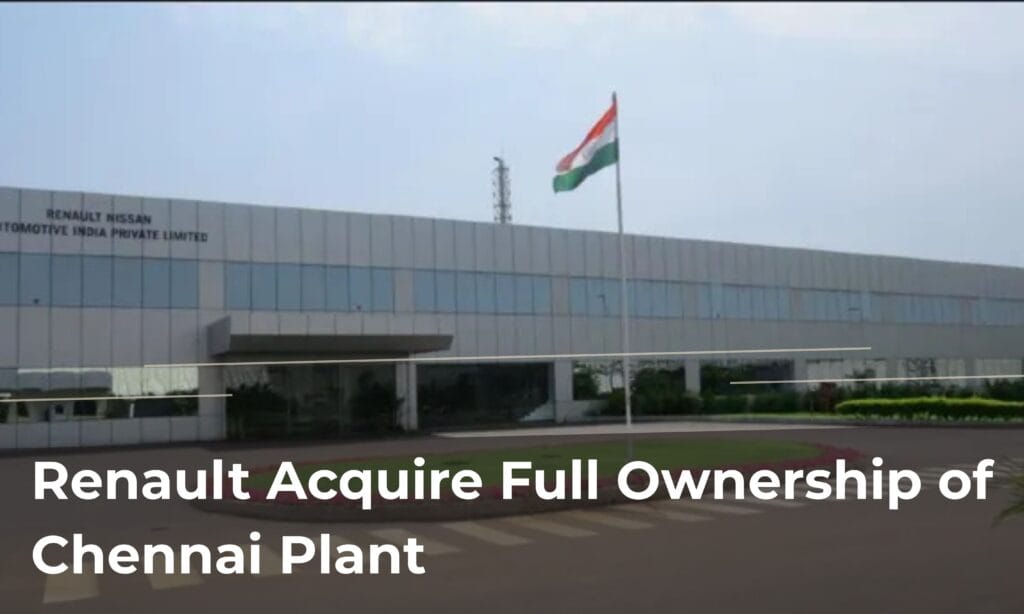Renault Group has recently taken a significant step in expanding its presence in India by acquiring the remaining 51% stake in Renault Nissan Automotive India Private Ltd (RNAIPL) from Nissan. This move gives Renault full control over the Chennai manufacturing facility, a key production hub for the automaker in India.
This acquisition follows the 2023 agreement between Renault and Nissan, which included a $600 million investment plan to develop six new models for the Indian market. The deal marks a strategic shift in Renault’s operations and raises important questions about the future of its manufacturing, product lineup, and overall market strategy in India.
Renault’s Growing Ambitions in India
Renault has been a key player in the Indian automotive market for over a decade. With popular models like the Renault Kwid, Kiger, and Triber, the company has built a strong customer base in the country. By acquiring full ownership of the Chennai plant, Renault aims to strengthen its manufacturing capabilities, streamline production, and introduce more India-focused vehicles

The Chennai facility, located in Oragadam, Tamil Nadu, has been a joint production hub for Renault and Nissan since 2008. It has played a crucial role in manufacturing and exporting vehicles to international markets. With this acquisition, Renault now has complete autonomy over operations, allowing it to accelerate decision-making and bring new models to market faster.
Impact on Renault’s Future Plans
Renault’s complete ownership of the Chennai plant aligns with its broader strategy to increase investment and expand its presence in India. Here’s how this move will impact the company’s future:
1. Faster Production & New Model Launches
With full control of the Chennai plant, Renault can optimize production lines and focus entirely on its brand strategy. The $600 million investment will be directed toward the development of six new models, including electric vehicles (EVs) and hybrid options, catering to India’s evolving automobile market.
2. Increased Localization & Cost Reduction
By taking complete control of the facility, Renault can increase the localization of vehicle components, reducing production costs and making its models more affordable for Indian buyers. This will allow the company to compete more aggressively with rivals like Maruti Suzuki, Hyundai, and Tata Motors.
3. Export Market Expansion
The Chennai plant has been an important export hub, supplying vehicles to markets in Africa, Latin America, and Southeast Asia. Renault’s independent management of the plant could lead to increased exports, making India a key manufacturing and export base for the company’s global operations.
4. Focus on Electric and Hybrid Vehicles
With India’s growing push towards green mobility, Renault is expected to use this opportunity to introduce more EVs and hybrid models. The company has already hinted at its plans to launch affordable electric cars tailored for Indian consumers. The Chennai plant will play a crucial role in manufacturing these vehicles and ensuring a steady supply for domestic and export markets.
What This Means for the Indian Automotive Market
Renault’s decision to take full control of the Chennai plant signals its long-term commitment to India. This move could have several implications for the broader automotive industry:
- Increased Competition: With Renault ramping up production, other automakers may need to accelerate their strategies to remain competitive in India’s budget and mid-range car segments.
- More Job Opportunities: Expanding production and launching new models will likely lead to increased employment opportunities in manufacturing, sales, and after-sales services.
- Better Customer Experience: With complete control over manufacturing and distribution, Renault can enhance after-sales service, reduce waiting periods, and introduce customer-friendly initiatives.
Final Thoughts
Renault’s acquisition of the Chennai plant is a significant move that reinforces its commitment to India. With complete ownership, the company is well-positioned to launch new models, increase local production, and contribute to India’s growing automotive sector.
As Renault gears up for its next phase of growth, Indian consumers can expect a more diverse lineup of vehicles, competitive pricing, and improved services. This strategic move could reshape Renault’s future in India and strengthen its position in the country’s fast-evolving automobile market.
Renault’s full control of the Chennai plant marks a new era for Indian car buyers! What does this mean for upcoming Renault models, affordability, and EVs?
Stay ahead with expert insights from My Car Wisdom. Follow us for the latest automotive updates, car buying tips, and industry trends!
Raja Yadav, the content writer at My Car Wisdom, brings a unique voice and style to our blog. With a knack for storytelling and a keen eye for detail, Raja ensures that every piece of content is informative, engaging, and easy to understand. His focus is on delivering high-quality articles that cater to both novice car owners and seasoned automotive enthusiasts.




